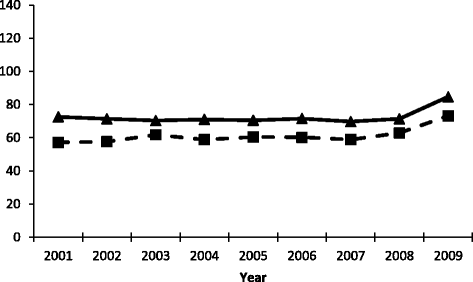Measuring colorectal cancer incidence: the performance of an algorithm using administrative health data
- PMID: 29739338
- PMCID: PMC5941340
- DOI: 10.1186/s12874-018-0494-x
Measuring colorectal cancer incidence: the performance of an algorithm using administrative health data
Abstract
Background: Certain cancer case ascertainment methods used in Quebec and elsewhere are known to underestimate the burden of cancer, particularly for some subgroups. Algorithms using claims data are a low-cost option to improve the quality of cancer surveillance, but have not frequently been implemented at the population-level. Our objectives were to 1) develop a colorectal cancer (CRC) case ascertainment algorithm using population-level hospitalization and physician billing data, 2) validate the algorithm, and 3) describe the characteristics of cases.
Methods: We linked physician billing, hospitalization, and tumor registry data for 2,013,430 Montreal residents age 20+ (2000-2010). We compared the performance of three algorithms based on diagnosis and treatment codes from different data sources. We described identified cases according to age, sex, socioeconomic status, treatment patterns, site distribution, and time trends. All statistical tests were two-sided.
Results: Our algorithm based on diagnosis and treatment codes identified 11,476 of the 12,933 incident CRC cases contained in the tumor registry as well as 2317 newly-captured cases. Our cases share similar overall time trends and site distributions to existing data, which increases our confidence in the algorithm. Our algorithm captured proportionally 35% more individuals age 50 and younger among CRC cases: 8.2% vs. 5.3%. The newly captured cases were also more likely to be living in socioeconomically advantaged areas.
Conclusions: Our algorithm provides a more complete picture of population-wide CRC incidence than existing case ascertainment methods. It could be used to estimate long-term incidence trends, aid in timely surveillance, and to inform interventions, in both Quebec and other jurisdictions.
Keywords: Administrative health data; Algorithm; Cancer registry; Colorectal cancer; Incidence.
Conflict of interest statement
Ethics approval and consent to participate
Use of the data was authorized by the Commission d’accès à l’information du Québec. The study was approved by the Université de Montréal ethics committee (Project 17–033-CERES-D). As data are from anonymized administrative data sources, informed consent was not required for this study.
Competing interests
The authors declare that they have no competing interests.
Publisher’s Note
Springer Nature remains neutral with regard to jurisdictional claims in published maps and institutional affiliations.
Figures


 FiTQ
FiTQ  Algorithm *Per 100,000, Quebec population in 2006 used as denominator. NB: Data series truncated due to fiscal to calendar year conversion and the 2-year inclusion criteria
Algorithm *Per 100,000, Quebec population in 2006 used as denominator. NB: Data series truncated due to fiscal to calendar year conversion and the 2-year inclusion criteria
 concordant vs
concordant vs  newly captured cases
newly captured casesReferences
-
- Statistics Canada. Leading causes of death, by sex, 2013,. https://www.statcan.gc.ca/pub/82-625-x/2017001/article/14776-eng.htm. Accessed Mar 2017.
-
- National Center for Health Statistics. Leading causes of death-number of deaths for leading causes of death,. https://www.cdc.gov/nchs/fastats/leading-causes-of-death.htm.
-
- NAACCR. North American Association of Central Cancer Registries. http://www.naaccr.org/certified-registries.
-
- Ministère de la Santé et des Services sociaux du Québec. Registre québécois du cancer. http://msssa4.msss.gouv.qc.ca/santpub/tumeurs.nsf/61a4a0842e5cbd34852568... (14 Dec 2015; date last accessed).
Publication types
MeSH terms
Grants and funding
LinkOut - more resources
Full Text Sources
Other Literature Sources
Medical

